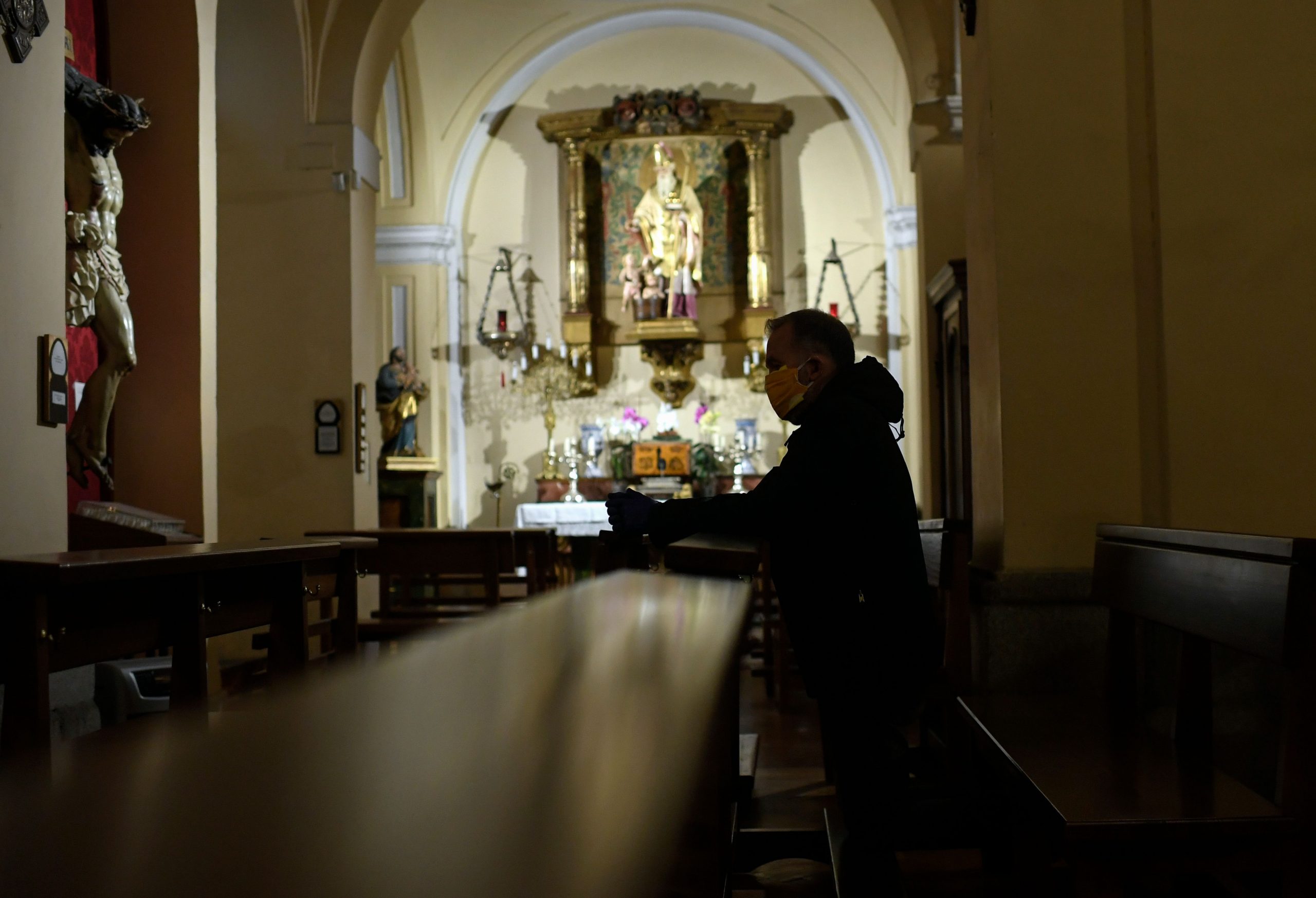
“The dress needs to be black, with a box neck; you must never show your shoulders,” explains Ana Villa, describing the strict protocol she follows when dressing for Easter. “If you are kneeling at a prayer bench, the skirt has to be long enough to cover your knees.”
At this time of year, in her home town of Malaga, women such as Ana walk for hours behind enormous, elaborate statues of Christ and the Virgin Mary carried slowly through the city’s streets. Dressed all in black and wearing veils made of delicate lace called mantillas, these austere yet strikingly elegant figures mourn the death of Jesus.
While Britons associate Easter with bunnies, chocolate eggs and hot cross buns, Spanish cities are awash with penitents marching solemnly to trumpets, drums and incense. The processions are particularly fervent in the south of Spain, where people come to their balconies to sing saetas – a mournful, religious form of flamenco singing. Some devotees walk the processions blindfolded, barefoot, on their knees, or even prostrate on the ground in acts of penance, consumed by the passion of Christ.
This year, the coronavirus pandemic that has devastated Spain means the country’s Catholics have had to forego the usual ceremonies. Parishes have ramped up activity on their digital channels to stay connected with their communities stuck at home – and Spanish children have watched their devout, churchgoing grandparents deftly navigate Instagram and YouTube to tune into live-streamed mass and rosary. This is the first time since 1933 – during conflicts that led to the Spanish Civil War – that Semana Santa (Holy Week) celebrations have been absent from the streets of Spain.
The processions, which take place officially in 27 Spanish cities, are organised by religious brotherhoods (called cofradías and hermandades) associated with a city’s various churches. Ana, 41, has observed Easter with the Hermandad de la Sentencia in Malaga since her teenage years. Theirs is one of the 45 different processions that usually traverse the city’s streets during Semana Santa, making it one of the most significant celebrations in Spain – topped only by that in Seville.
“This is essentially a display of faith,” says José Antonio Fernández Cabrero, elder brother of the Hermandad de la Macarena in Seville. “But you can’t understand Semana Santa without understanding the tradition, customs and expression of the people of Seville.”
Such brotherhoods are financed by the donations of their faithful members, and La Macarena has over 15,000 of them. Nearly 4,000 penitents walked in its procession in 2019 – but this year, the brotherhood has had to move its activities online. Its virtual via crucis (the traditional prayers honouring the 14 stations of the crucifixion and resurrection) had over 17,000 viewers and a live broadcast of the basilica has been in place 24/7.
In the time of Covid-19, religious communities the world over are having to adapt to new ways of worshiping. Jews began celebrating Passover on 8 April – but could only share the traditional seder dinner with their loved ones through online video calls. A 24-hour curfew has been imposed at Mecca and Medina, and the 2.5 million Muslims who take the annual Hajj pilgrimage in July and August are being asked to delay making any plans. Indian prime minister Narendra Modi has encouraged the country’s 966 million Hindus to forgo temple visits in favour of praying and lighting candles at home.
Aside from a spiritual experience, Semana Santa is big business in Spain. In Seville alone, Easter week generated €400m last year; and a study by the University of Malaga suggests that the cancellation of this year’s festivities, including the closure of hotels and shops, could cost the Malaga economy over €102m. A brotherhood in Andalucia could spend up to €45,000 on its procession – most of which would have been spent before Semana Santa was cancelled. Fernández Cabrero fears this crisis will cause losses of “important quantities” for La Macarena. “We will recover,” he says, “but not without great effort. All kinds of actions will be required to generate income to offset these losses.”
Francisco Vélez is president of the Consejo de Cofradías, the independent body that represents Seville’s 125 religious brotherhoods and oversees the overall structure of the city’s Holy Week celebrations. This year, in the absence of the processions, he has seen the city’s brotherhoods increase their charity and community activities. “There is a greater effort to help people in need,” he says: “distributing face masks, delivering goods to the elderly, and supporting people and sectors who are suffering economically.” Nonetheless, Easter week has reminded him of how Spain’s various professional sectors will be impacted by the Covid-19 emergency.
Although 70 per cent of Spain is Catholic, the traditions of this time of year reach beyond this religious group. In León, in the country’s north, an alternative, secular brotherhood has held its own procession for many decades. Rather than worshipping Christ, this cofradía honours Genarín, an infamous local rogue who was run over and killed by a garbage truck on Maundy Thursday in 1929. The irreverent counter-procession – which was attended by 20,000 people last year – brings together the side of the León less attached to the Catholic church, but with the same desire for community and solidarity.
The close of Semana Santa marks four weeks since the start of Spain’s lockdown; the Easter story takes on a particularly powerful meaning this year, as the country mourns the more than 16,000 lives lost to coronavirus. But the crucifixion is also a tale of rebirth. “Death alone would have no meaning,” says Vélez. There is already talk among Seville’s brotherhoods of a new kind of procession for the autumn – one of thanksgiving, in what they hope will be a Spain resurrected from the crisis that has brought it to its knees.
Agnish Ray is a freelance writer based in Madrid





